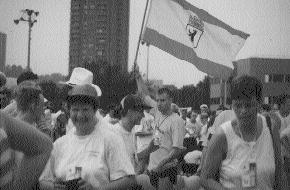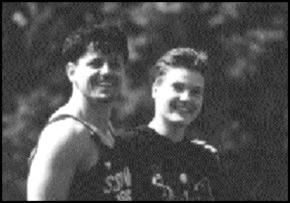

1992 Den Haag
1993 Den Haag
1995 Frankfurt/M
1996 Berlin
1997 Paris
The history of the EuroGames is
still very young. Only in the early 1990s, in 1992, did the
Gay-Lesbian European Championships come into existence. The
EuroGames were inspired by its big sister the Gay Games, a gay
and lesbian Olympics which first took place in San Francisco in
1982. The former Olympic decathlon competitor, Dr. Tom Wadell,
initiated the sports meeting. Given that in the official world of
sports there was and is little space for openly gay and lesbian
participants, and that few felt or feel comfortable in
traditional  sports groups, he argued that separate sport
competitions needed to be created. Thus the Gay Olympics were
born which, however, had to change its name after losing in court
to the American Section of the IOC, providing a final argument
for continuing along the chosen path. At the first two Gay Games,
which took place in 1982 and 1986 in San Francisco, European
sportsmen and sportswomen were sparsely represented. In 1990,
however, on the occasion of the `Celebration 90`, the GayGames in
Vancouver, it became clear that the gay-lesbian sports-movement
in Europe was also spreading. A few hundred activists took it
upon themselves to make the long trip to
sports groups, he argued that separate sport
competitions needed to be created. Thus the Gay Olympics were
born which, however, had to change its name after losing in court
to the American Section of the IOC, providing a final argument
for continuing along the chosen path. At the first two Gay Games,
which took place in 1982 and 1986 in San Francisco, European
sportsmen and sportswomen were sparsely represented. In 1990,
however, on the occasion of the `Celebration 90`, the GayGames in
Vancouver, it became clear that the gay-lesbian sports-movement
in Europe was also spreading. A few hundred activists took it
upon themselves to make the long trip to  Canadas wonderful western metropolis and were
rewarded with a huge familial event which had never previously
taken place in this form. The enthusiasm for and joy in doing
sports with like-minded others in a relaxed manner was
transported over the Atlantic. Our famous event, the Gay and
Lesbian Run, was born out of this elation and first took place in
1991. But the EuroGames were also hit upon and in 1992 and 1993,
some 300 guests gathered in Den Haag for what was then still a
small multi-sport tournament. In 1995, however, more than 2,000
athletes participated in the EuroGames III. The boom in
participants was occasioned by the huge spectacle of the Gay
Games 1994 in New York, where many Europeans were involved, and
the fact that the gay-lesbian sports movement in Europe has
awakened from its Sleeping Beauty slumber. In Berlin we expect
some 3,000 sportsmen and sportswomen who will compete in 18 forms
of sport. Paris follows in 1997, while in 1998 Amsterdam will
host the Gay Games, so that there will be no EuroGames that year.
For the final year of this century there are already a number of
cities under consideration. Europe comes together, and gay and
lesbians must have an equal place in it the EuroGames helps make
this happen.
Canadas wonderful western metropolis and were
rewarded with a huge familial event which had never previously
taken place in this form. The enthusiasm for and joy in doing
sports with like-minded others in a relaxed manner was
transported over the Atlantic. Our famous event, the Gay and
Lesbian Run, was born out of this elation and first took place in
1991. But the EuroGames were also hit upon and in 1992 and 1993,
some 300 guests gathered in Den Haag for what was then still a
small multi-sport tournament. In 1995, however, more than 2,000
athletes participated in the EuroGames III. The boom in
participants was occasioned by the huge spectacle of the Gay
Games 1994 in New York, where many Europeans were involved, and
the fact that the gay-lesbian sports movement in Europe has
awakened from its Sleeping Beauty slumber. In Berlin we expect
some 3,000 sportsmen and sportswomen who will compete in 18 forms
of sport. Paris follows in 1997, while in 1998 Amsterdam will
host the Gay Games, so that there will be no EuroGames that year.
For the final year of this century there are already a number of
cities under consideration. Europe comes together, and gay and
lesbians must have an equal place in it the EuroGames helps make
this happen.